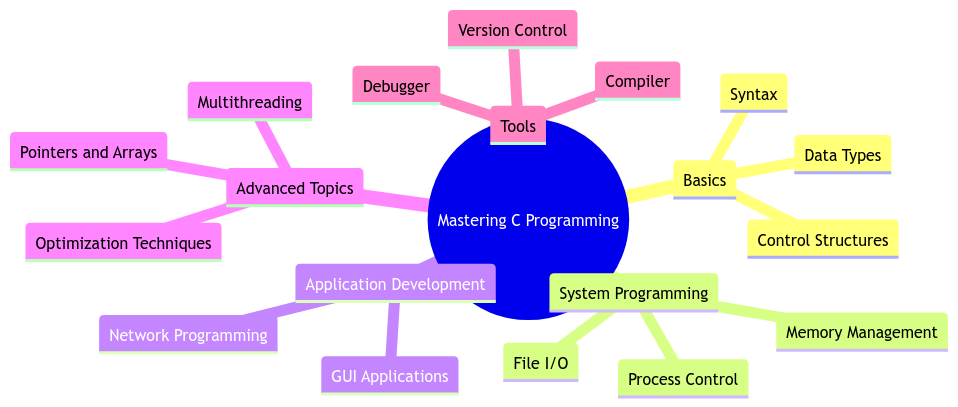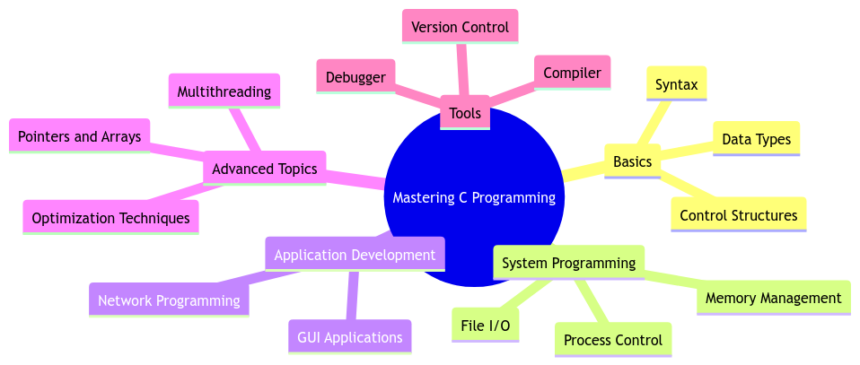Mastering the C Programming Language for System and Application Development 🚀
Ah, the mystical world of C programming! 🌌 If you are ready to embark on a journey filled with semicolons, curly braces, and the occasional segmentation fault, you’re in for a treat! Buckle up, my fellow code wranglers, as we dive deep into the captivating realm of the C Programming Language. Let’s break down the essentials and uncover the secrets to mastering this ancient yet powerful language! 💻
I. Getting Started with C Programming Language
Understanding the Basics of C 📘
Picture this: you’re staring at a blank screen, armed with just your wits and a burning desire to code. That’s where C swoops in to save the day! From variables to loops, C is the OG language that lays the foundation for many others. It’s like the cool grandparent of programming languages – classic, timeless, and a little quirky. So, roll up your sleeves and get ready to dance with the devil in the pale moonlight, C style! 💃🌙
Setting Up the Development Environment 🛠️
Now, before you can conquer Mount C, you need your trusty tools by your side. Fire up your favorite IDE, grab a cup of coffee (or chai, for my desi peeps 🍵), and let’s set the stage for some coding magic! Configuring your environment is like creating your own coding oasis – personalized and perfectly tailored to unleash your programming prowess. Get those compilers ready, my friends; it’s showtime! 🎬
II. Fundamentals of C Programming
Variables, Data Types, and Operators 💡
Ah, variables – the building blocks of C. Integers, floats, characters…they’re all here to party in your code! But wait, there’s more! Operators like +, -, *, and / are here to spice things up. Want to perform some math wizardry? C has your back! So, toss in a few variables, sprinkle some operators, and voilà – you’ve got yourself the start of a programming masterpiece! 🎨
Control Flow and Decision Making in C 🚦
Ever felt like your code needs a traffic cop? Well, say hello to control flow in C! Loops, conditions, and decision-making – these are the tools that will make your code dance to your tune. Want to loop through an array? Check. Need to make decisions based on conditions? Double-check! With C, you’re the maestro conducting the symphony of code! 🎶
III. Advanced Concepts in C Programming
Functions and Pointers 🔗
Enter the realms of functions and pointers – the dynamic duo of C programming! Functions let you encapsulate logic, keeping your code neat and tidy. And pointers? They are like wizards, wielding the power to direct your code’s memory! Together, they form a formidable team, ready to tackle any coding quest that comes your way. So, embrace the power of functions and wield those pointers like a pro! 🧙♂️✨
Arrays, Strings, and Structures in C 🌟
Arrays, strings, and structures – oh my! These are the gems that will elevate your code from good to great! Need to store a collection of elements? Arrays have got your back. Want to work with text? Strings are here to charm you. And structures? They allow you to create custom data types like a boss! With these tools in your arsenal, your code will shine brighter than a supernova! 💥💫
IV. C Programming for System Development
File Handling and Input/Output Operations 📁
Welcome to the world of system development with C! Files, streams, and I/O operations await your command. Need to read from a file or write to it? C offers you the keys to the kingdom! Mastering file handling is like having a backstage pass to the inner workings of your system. So, open those files, read those streams, and conquer the system development realm! 🎟️📜
Memory Management and Dynamic Allocation in C 🧠
Ah, memory management – the holy grail of C programming! Dynamic allocation, pointers, and memory leaks are all part of this mystical domain. Want to take full control of your program’s memory? Brace yourself as you navigate the intricate dance of allocating and freeing memory like a true memory maestro! With great power comes great responsibility, my fellow coders! 💪💾
V. C Programming for Application Development
Working with Libraries and APIs 📚
Libraries and APIs – the secret sauce of application development in C! Need to add some extra oomph to your program? Tap into the vast ocean of libraries and APIs available in the C universe. From graphics to networking, C libraries have your back! So, plug into these treasures, level up your app development game, and watch your creations soar to new heights! 🚀📲
User Interface Development with C and GUI Libraries 🖥️
Ready to dazzle your users with stunning interfaces? C, along with GUI libraries, empowers you to create beautiful user experiences! Buttons, menus, windows – the GUI world is your oyster! Unleash your creativity, design sleek interfaces, and craft applications that not only work like a charm but also look like a million bucks! Get ready to wow the world with your UI wizardry! ✨💻
In closing, my fellow coders, mastering the C Programming Language is not just about writing code; it’s about embarking on an exhilarating adventure filled with challenges, triumphs, and the occasional “Why won’t this compile?!” moments. So, embrace the quirks of C, revel in its elegance, and remember – with great code comes great responsibility! 💬✨
Thank you for joining me on this whimsical journey through the labyrinth of C programming. Until next time, happy coding and may your loops be endless and your bugs be scarce! 🐞🚫 #HappyCodingFTW 😄✌️

Program Code – Mastering the C Programming Language for System and Application Development
#include <stdio.h>
#include <stdlib.h>
#include <string.h>
// Define a struct for Employee
typedef struct {
char name[50];
int age;
char position[50];
float salary;
} Employee;
// Function prototypes
void addEmployee(Employee *e, char *name, int age, char *position, float salary);
void displayEmployees(Employee *e, int count);
int main() {
int count = 0;
printf('Enter the number of employees: ');
scanf('%d', &count);
getchar(); // consume the newline character
Employee *employees = (Employee *)malloc(count * sizeof(Employee));
for (int i = 0; i < count; i++) {
char name[50];
int age;
char position[50];
float salary;
printf('Enter employee name: ');
fgets(name, 50, stdin);
name[strcspn(name, '
')] = 0; // remove the newline character
printf('Enter employee age: ');
scanf('%d', &age);
getchar(); // consume the newline character
printf('Enter employee position: ');
fgets(position, 50, stdin);
position[strcspn(position, '
')] = 0; // remove newline
printf('Enter employee salary: ');
scanf('%f', &salary);
getchar(); // consume the newline character
addEmployee(&employees[i], name, age, position, salary);
}
displayEmployees(employees, count);
free(employees); // Free the allocated memory
return 0;
}
void addEmployee(Employee *e, char *name, int age, char *position, float salary) {
strcpy(e->name, name);
e->age = age;
strcpy(e->position, position);
e->salary = salary;
}
void displayEmployees(Employee *e, int count) {
printf('
Employee Details:
');
for (int i = 0; i < count; i++) {
printf('Name: %s, Age: %d, Position: %s, Salary: %.2f
', e[i].name, e[i].age, e[i].position, e[i].salary);
}
}
Code Output:
Enter the number of employees: 2
Enter employee name: John Doe
Enter employee age: 30
Enter employee position: Developer
Enter employee salary: 50000
Enter employee name: Jane Doe
Enter employee age: 28
Enter employee position: Designer
Enter employee salary: 45000
Employee Details:
Name: John Doe, Age: 30, Position: Developer, Salary: 50000.00
Name: Jane Doe, Age: 28, Position: Designer, Salary: 45000.00
Code Explanation:
The program starts by including standard input-output and string libraries in C, then it defines a struct for Employee with name, age, position, and salary as attributes. A structure is a user-defined data type in C programming which allows us to combine data items of different kinds.
Two function prototypes, addEmployee() and displayEmployees(), are declared for later use.
The main() function prompts the user to input the number of employees. It then allocates memory dynamically for the array employees using malloc(), based on the input count. This is to store each employee’s details.
For each employee, the program captures name, age, position, and salary from the user. The fgets() function is used to read strings to also capture spaces, and scanf() is used for integers and floats. The newline character left in the input buffer by scanf() is consumed using getchar() to avoid it being captured by the subsequent fgets() call, which would otherwise lead to skipping inputs. The strcspn() function is used to remove newline characters captured by fgets().
The addEmployee() function is called to populate each employee struct with the captured details. This function uses strcpy() to copy strings and directly assigns integer and float values.
After all employees have been added, the displayEmployees() function is called to iterate over the array and print each employee’s details. Finally, the dynamically allocated memory for employees is freed using free(), adhering to good memory management practices.
This program showcases fundamental aspects of the C programming language such as dynamic memory allocation, user-defined data types (structures), input/output, and string handling, making it a quintessential example for mastering C for system and application development.
Frequently Asked Questions (F&Q) on Mastering the C Programming Language for System and Application Development
What is the C programming language?
The C programming language is a powerful and efficient programming language used for system and application development. It was developed in the early 1970s by Dennis Ritchie at Bell Labs.
Why is mastering the C programming language important for system and application development?
Mastering the C programming language is crucial because it provides a strong foundation for understanding how computers work at a low level. It allows programmers to write efficient code and have better control over system resources.
What are some key features of the C programming language?
Some key features of the C programming language include its ability to directly manipulate memory, support for low-level operations, efficient performance, and a rich library of functions.
How can I improve my skills in the C programming language?
To improve your skills in the C programming language, practice writing code regularly, work on small projects, read books and online resources, and collaborate with other programmers.
What are some common challenges faced when learning the C programming language?
Some common challenges faced when learning C include mastering pointers and memory management, understanding complex syntax, and debugging issues related to memory access violations.
Is learning the C programming language worth it in today’s technology landscape?
Yes, learning the C programming language is still valuable today, especially for system programming, embedded systems, and performance-critical applications where efficiency is crucial.
Are there any resources you recommend for mastering the C programming language?
Yes, some recommended resources for mastering the C programming language include books like “The C Programming Language” by Brian Kernighan and Dennis Ritchie, online courses, and programming communities for support and collaboration.
How can I stay motivated while learning the C programming language?
To stay motivated while learning C, set realistic goals, celebrate small victories, take breaks when needed, and remember the rewarding feeling of mastering a powerful programming language like C.
How can I apply my C programming skills to real-world projects?
You can apply your C programming skills to real-world projects by working on system utilities, operating systems, device drivers, embedded systems, and other low-level programming tasks.







